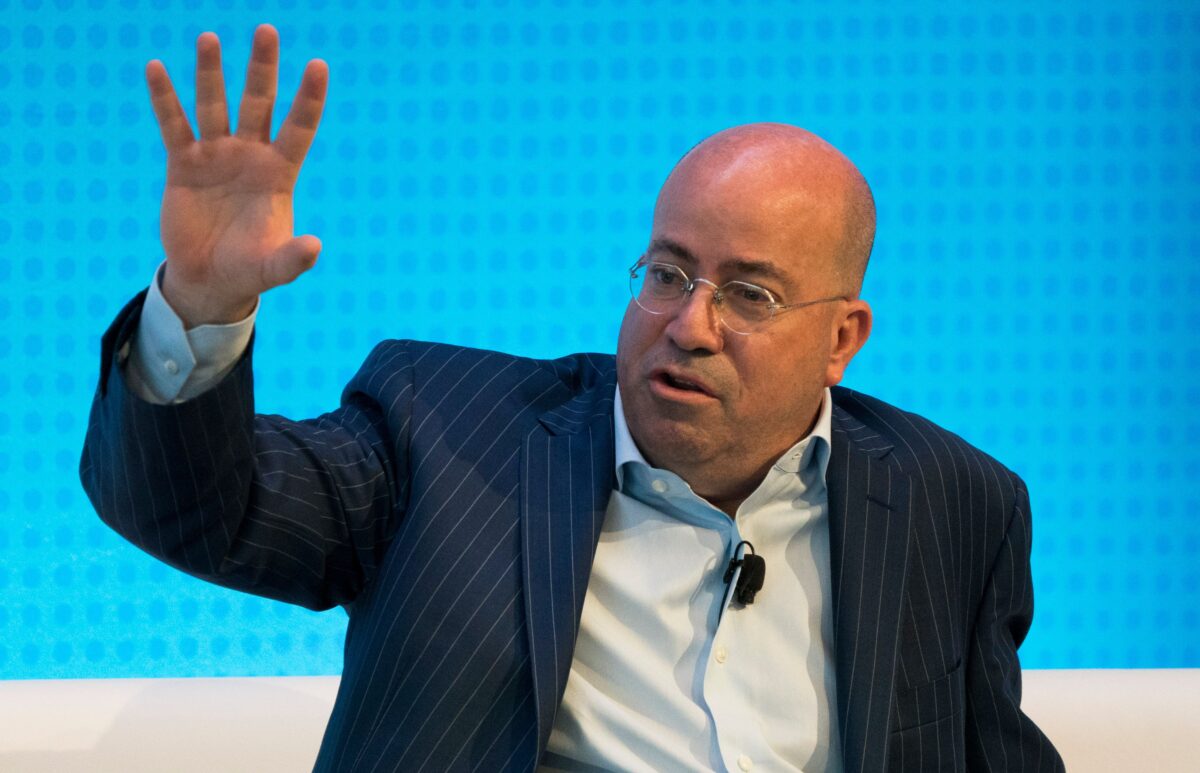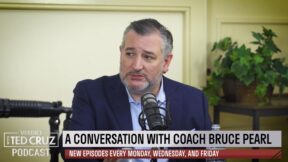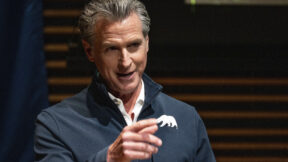Jeff Zucker’s Terrible, Horrible, No Good, Very Bad Year: A Tumultuous 2021 Was Key to His Ouster

Don Emmert/AFP/Getty Images
What a difference a year makes.
In January 2021, CNN enjoyed the rarefied air of being the top-rated cable news network, while rival Fox News was in a record tailspin. Cable news insiders were left guessing whether president Jeff Zucker would extend his contract. He was sitting in the catbird seat, having led his network from worst to first over eight years and shaping CNN into a political and cultural phenomenon during the Trump administration.
Cut to one year later, and not only has Fox returned to the number one spot but has done so dominantly. For 25 weeks, more cable news viewers have been tuned into Fox News than MSNBC and CNN combined. And Zucker is no longer in his job after a stunning forced resignation, allegedly over his failure to disclose a personal relationship with CNN chief marketing officer and head of communications Allison Gollust.
Like the old board game Clue, there were a lot of suspects behind this stunning ouster. Was it the Cuomos with a legal document? Was it top Discovery shareholder John Malone (who loves Fox News) exerting pressure in the board room? Or was, as many at CNN reportedly believe, CEO Jason Kilar exacting revenge from his WarnerMedia office?
The real truth of Zucker’s ouster may one day come out. But I posit that if CNN were in much better shape in advance of the merger between WarnerMedia and Discovery, Zucker would not be out of his job due to a misdemeanor HR technicality. Indeed, a quick autopsy of CNN shows a network battered by a year of tumult under his leadership.
For one, CNN’s ratings are way down. So too are the ratings at all cable networks, but CNN’s are down more than others. They will tell you that 2021 was still the second most-watched year in their history and that CNN had thrived during big news stories. More people tune into Fox News for big stories, but CNN does see an increase with real news stories over hot takes.
2020 was a magical year for big news. There was a presidential election, a once-in-a-century pandemic, a bitterly divided body politic, and President Donald Trump’s baseless claim of a stolen election, which led to a violent attack on the Capitol by his supporters. 2020 saw the first impeachment trial of Trump, and his second came in early 2021.
CNN’s decline in viewership can be chalked up to a massive post-Trump tune-out. But Zucker also had significant programming maneuvers that did not stem the decline in ratings. They may have even hastened them. A rather substantial re-tooling of CNN’s dayside slate happened in January. Alisyn Camerota moved to an afternoon CNN Newsroom and afternoon anchor Brianna Keilar joined John Berman as co-host of the morning show New Day. Ana Cabrera got an hour in the afternoon, and Jake Tapper got a second hour at the expense of Wolf Blitzer’s The Situation Room.
If we were to judge these moves solely by the buzz of media coverage that CNN has garnered, then you could call this a wild success. And maybe that’s the sort of increased influence that executives were considering when they made the programming moves.
But coverage of your opinion hosts doesn’t pay the bills, advertisers do, and the amount of soap sold is directly related to the number of in-demo viewers that tune in. Judged purely by that measure? The retooled New Day has been a ratings debacle. Last month, there were days in which hourly in-demo viewers totaled less than 40,000. New Day is still a terrific morning show, one that we’ve lauded as the best on cable news, but right now people are just not tuning in.
*********
A rocky 2021 has given way to a chaotic 2022 for CNN. The network still doesn’t have a host for its 9 p.m. hour since Chris Cuomo was dismissed for advising his brother, former New York Governor Andrew Cuomo.
Zucker’s handling of Cuomo’s ouster — an ouster that with the benefit of hindsight now appears more inevitable — now looks downright incompetent. There was no plan to replace the anchor, and the 9 p.m. hour was recently dedicated to a special, hosted by first Brianna Keilar and then Jim Acosta, focused on threats to democracy. Not exactly ratings gold, though to be fair, neither were exactly put in a place for success.
While CNN has turned to bombastic opinionators to fill the 9 p.m. slot for now, the network has also long boasted a terrific bench of talented journalists and news anchors. It is still very much a newsgathering source, one of the best in the industry, which truly sets CNN apart from MSNBC and, in particular, Fox News.
Yet that strength is also a challenge in the new cable news ecosphere, particularly when there isn’t a major news story compelling viewers to tune into CNN. In this environment, Zucker’s inclination to turn to hosts like Keilar and Acosta is understandable — given that opinion content has typically proven to be a ratings draw in cable news. It is no coincidence that the top-rated cable news programs have the strongest opinions.
Take, for example, the top-rated Tucker Carlson. One can easily argue that his half-baked conspiracy theories are a pernicious force in media. He has undermined Covid-19 mitigation efforts and helped foster dangerous levels of vaccine hesitancy. It’s not hyperbole to say that his political opinions have amplified authoritarianism and undermined democracy.
But Tucker’s bullshittery presents a problem for CNN: How do they cover it? Carlson is by any definition the de facto leader of the Republican Party, at least in spirit. And so on one level, CNN seems justified in dispatching hosts like Acosta and Keilar, as well as CNN’s media team of Brian Stelter and Oliver Darcy, to cover their rival network aggressively.
Yet covering Fox is a tricky wicket: if one is interested in the coverage of Tucker’s often absurdist and sometimes asinine commentary, then why not just tune into Fox News and see for yourself? A recent report illustrates this conundrum: young Democrats are opting to watch Tucker Carlson Tonight more than any other show on cable news.
But CNN’s brand has never built on opinion, which is perhaps where things have gone south, or why there is a disconnect. Whatever the network feels to be its civic responsibility in an era of Fox News dominance, the TV business is ultimately about attracting viewers. And in the last year CNN has been shedding them. Which, perhaps, is why CNN has made a foray into streaming its biggest bet in 2022.
*********
The network has made the much-ballyhooed streaming product CNN+ its focus for the first half of this year. There is no question that streaming is the future of video news consumption and the CNN brand is incredibly valuable to sponsors who want to attach their brand. But who is the precise target audience for CNN+? CNN viewers that can’t get enough of the linear product?
Zucker has explained to the New York Times that CNN+ is designed to “widen the aperture” of CNN’s purview, and they have brought in top talent like Chris Wallace from Fox News, Audie Cornish from NPR, Alison Roman from the wild west of newsletters. They’ve also announced other CNN stalwarts like Jake Tapper, Poppy Harlow, and Fareed Zakaria will join Blitzer on this new platform.
But the network is taking an awfully big financial risk on an untested product.
CNN+ is not the network’s first foray into digital video growth and emergence. They infamously acquired developed Great Big Story with a reported committed budget of $40 million. They also purchased Casey Niestat’s outlet Beme in another seven-figure deal. These acquisitions came with great fanfare and glorious quotes from chief digital officer Andrew Morse, as did their initial deal with Facebook. None of these projects currently exist as they were launched.
Streaming is a different beast than ad-supported stand-alone videos, and one could argue that the growing number of cord-cutters will eagerly pay for content from a brand as well known as CNN. But the best way to support a new streaming product is a healthy and highly-rated linear product, and right now, CNN is struggling in that regard. Look, there is no question that CNN should have a streaming platform. But to hire 200 new staff members to build out supply when there currently lacks demand for the linear product presents a serious challenge. And raises questions about its planning.
Will this vision for the streaming product be shared by the incoming administration? John Malone, the top Discovery shareholder — and all-around cable news rainmaker — was recently asked about what’s next for cable news in light of CNN’s future under Discovery. His comments were almost certainly not well received at CNN’s Hudson Yards HQ. After lauding Fox News and shouting out Brit Hume and Bret Baier, Malone pointedly suggested CNN return to journalism — suggesting that what they are doing now isn’t.
Malone’s comments came up Sunday on CNN’s Reliable Sources, when Stelter asked New Yorker writer and well-respected media mensch Ken Auletta about them. Stelter oddly noted that his former boss Jeff Zucker found those comments “disturbing” and added future shareholder Malone won’t have much power in the Discovery-WarnerMedia corporate umbrella under which CNN will soon exist. Some have called that take either “incredibly brave or incredibly reckless.”
But Auletta did not mince words in saying that “If I was at CNN and I was an employee and I loved working under Jeff Zucker for understandable reasons I would be concerned.” At that moment it almost felt like a direct warning to Stelter. His “rogue” defense of CNN was widely praised within the network’s offices, but he has also become something of the face of Jeff Zucker’s CNN over the past few years. Maybe that’s not the safest spot to be in at the moment, or at least call out the lack of power of Fox News enthusiast John Malone.
That comment could be seen as a shot across the bow for the more opinionated hosts that Zucker championed. And indeed, Variety’s Brian Steinberg posited this week that CNN could “face a reset” under new leadership that would turn down the volume, and perhaps, fold streaming content into the Discovery+ platform.
Zucker was beloved by his staff, particularly on-air talent and show-runners, who felt remarkably supported and encouraged by the veteran television executive. He is a whip-smart and charming news junkie who created a culture at CNN that seemed to have very little infighting and personnel drama, which is something of a miracle given the outsized egos and remarkable thin skin that television hosts on all networks seem to have.
But the protection that Zucker provided his staff created something of a cult of personality, and now that he has left the building, the elegiac on-air praise from CNN hosts veers close to cultish.
I really liked CNN under Zucker. It was the one network that would feature competing points of view and consistently offered smart and reliable reporting. On the other hand, the shift into occasionally sanctimonious opinion drew more enemies than viewers and the sometimes self-satisfied smarm grew tiresome.
Which might be a bigger reason why CNN is currently without a president.
This is an opinion piece. The views expressed in this article are those of just the author.





Comments
↓ Scroll down for comments ↓